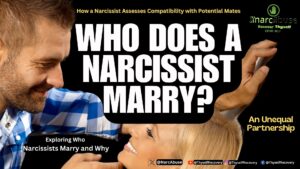Why Stay Married to a Narcissist?
Being married to a narcissistic partner is an immense challenge rife with manipulation, exploitation, and chronic emotional anguish. Most describe life with a narcissist spouse as a “living nightmare” or “walking on eggshells.” The baffling question is why someone would remain married to a narcissist despite such toxicity. While leaving such dysfunction may seem obvious, many complex psychological and logistical factors conspire to keep victims trapped in narcissistic marriages.
The Role of Optimism Bias in Staying
Optimism bias causes people to underestimate risks and overestimate their chances of overcoming obstacles. It explains why victims stay, hoping their narcissistic partner will change for the better. This bias leads them to:
- Minimize red flags and worrisome behaviors
- Assume positive change is right around the corner
- Believe their love and loyalty can “fix” their partner
- Rationalize the abuse and make excuses for their spouse
This hope locks them into the relationship despite mounting evidence it is irreparable.
The Sense of Marital Duty and Obligation
Many cling to their marital vows as justification for staying despite narcissistic abuse. They feel ethically obligated to stand by their spouse in sickness and in health until death do they part. This sense of duty leads them to:
- Silence their protests and needs to try stabilizing the marriage
- View leaving as a personal failure and moral shortcoming
- Endure whatever abuse comes their way in the name of loyalty
- Suppress their own distress to retroactively consent to the dysfunction
This misguided sense of righteousness and virtue keeps them trapped.
Avoiding Confrontation and Conflict
Narcissists skillfully train their partners to avoid confronting their unhealthy behaviors or questioning their actions. Victims stay in order to keep the peace and prevent potentially explosive outbursts, stonewalling, or retaliation by:
- Complying with whatever the narcissist wants
- Censoring their discomfort or objections
- Withdrawing from making any relationship repairs
- Tiptoeing around topics that might provoke the narcissist’s rage
This conflict avoidance enables the dysfunction to continue.
Prioritizing Children Over Your Own Wellbeing
Many remain married to a narcissist for the sake of their children. They are willing to sacrifice their own safety and sanity to try keeping the family unit together and avoid disrupting their kids’ lives. They may cling to fantasies of their children having normal, happy childhoods with two married parents together under one stable roof. This self-sacrifice ultimately enables abuse to continue generationally.
Economic Realities Impacting Separation
Financial entanglements with a narcissistic spouse create tremendous barriers to separation and independence. Victims may face realities like:
- Lack of personal income or employment due to years as a homemaker
- Poor credit due to debts accrued in the narcissist’s name
- No access to marital funds the narcissist controls
- No savings of their own to obtain housing
- Poverty or dependence on the narcissist’s support payments after divorce
These financial handcuffs often coerce victims to stay in oppressive narcissistic marriages.
Fear of the Unknown Post-Divorce
The prospect of leaving a long-term marriage is frightening, as victims face a complete upheaval of their familiar world. Anxiety about the unknowns that lie ahead outside the narcissistic relationship can incentivize staying, including:
- Loneliness
- Difficulty providing for themselves financially
- Their ability to co-parent with a narcissistic ex
- Dating again after enduring years of criticism about their desirability
- Losing mutual friends in the divorce
- Coping with the narcissist’s certain retaliation
- Existential questions about identity and purpose without the narcissist
This anxiety compounds the temptation to maintain the status quo.
Trauma Bonds: The Ties that Bind
Trauma bonds resulting from the narcissist’s abuse mimic addiction in the brain. The partner yearns for the validation of intermittent affection from their narcissist like an addict craves their drug. Brain chemicals like oxytocin and cortisol impair judgment and reinforce this attachment. Escaping the biochemical and emotional ties trapping victims with their abuser is tremendously difficult.
The Tenacity of Identity as Their Partner’s Savior
Partners of narcissists often adopt strong caretaker or rescuer identities. Narcissists deliberately foster this delusion by framing the victim as the one person who can “save” them from their painful past. Victims clinging to this caregiver identity and sense of purpose stay in hopes of healing their spouse. Abandoning this role would mean giving up part of their own self-concept.
Considering Your Own Role in the Dysfunction
In many dysfunctional marriages, both parties unconsciously perpetuate toxic patterns. Victims of narcissists often have underlying issues like:
- Codependency and enmeshment habits
- Approval-seeking and conflict avoidance
- Learned helplessness and low self-esteem
- Tendency to over-empathize with the narcissist
These traits inhibit enforcing boundaries and manifest in enabling behaviors. Addressing any personal contributions is essential before victims can leave.
In summary, a mix of psychological defenses, emotional trauma bonds, financial constraints, and identity challenges keep victims bonded to narcissistic partners. But with self-work and external support, victims can rewrite their internal narratives and obtain the resources needed to forge a different path.

